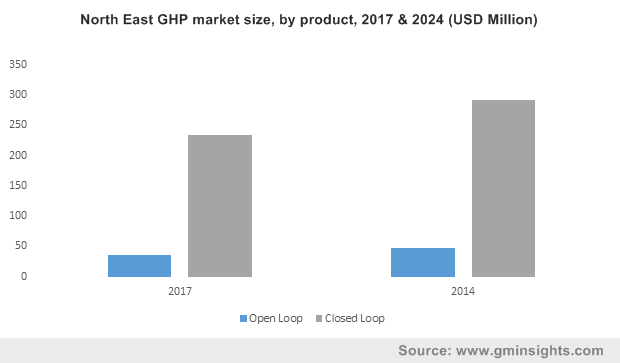U.S. geothermal heat pump market to register a commendable growth rate from residential applications, closed loop products to witness an upsurge in sales by 2024
Publisher : Fractovia | Published Date : 2018-12-28Request Sample
The expansive growth of the U.S. geothermal heat pump market can be aptly credited to the robust enforcement of stringent government norms to minimize CO2 emissions. In a manner of speaking, geothermal heat pumps (GHP) are one of the most energy efficient and sustainable heating and cooling technologies available in the market. The system efficiently utilizes earth’s natural heat energy to drive heating or cooling applications which often comprise water heating.
North East GHP market size, by product, 2017 & 2024 (USD Million)

The U.S. Department of Energy claims that geothermal systems can minimize energy consumption by around 25% to 50% compared to conventional air source heat pump systems. Moreover, the system can reach high efficiencies of around 300%-600% on colder winter nights, that would prove to be highly rewarding for the U.S. geothermal heat pump market expansion across the cold zones of Wisconsin, Minnesota, and North Dakota.
U.S. geothermal heat pump market to accrue substantial returns from residential applications
Geothermal heat pump systems, being one of the most cost-effective home heating and cooling options available, is particularly suitable for new residential building or existing homes as they can be conveniently replaced with current heating/cooling systems like HVAC. Although their installation costs are higher than air source systems of the same cooling and heating capacity, users have been adopting geothermal heat pumps often since they easily recoup the added costs in energy savings in 5 to 10 years. GHP systems have an average 20+ year life expectation for the heat pump and around 25 to 50 years for the system’s underground infrastructure, making them one of the most viable options for residential establishments. It is thus rather overt that the U.S. geothermal heat pump market will procure hefty proceeds from residential applications.
Rising investments toward the construction of single house buildings along with availability of persistent ground temperature will also serve to augment the U.S. geothermal heat pump market size from residential construction. Not to mention, government measures to encourage the adoption of renewable energy along with stringent norms pertaining to CO2 emissions will further stimulate the regional industry outlook. For instance, as per the U.S. DoE, geothermal heat pump systems installed in new or existing homes by December 31, 2016 are eligible for a 30% federal tax credit.
Closed loop products to gain momentum in U.S. geothermal heat pump market
Closed loop GHP systems are used for residential setups or new construction where abundant land is available. For small commercial complex and school’s vertical systems are preferred due to its limited space requirement features. Ability to circulate frost-free solution using underground piping loops for transferring ground heat to the pump will further the system’s adoption, thereby augmenting the overall business landscape. Low operation and maintenance costs and improved reliability are the few parameters that will further enhance the system’s adoption.
According to the U.S. Environmental Protection Agency (EPA), geothermal heat pumps surpass most technologies as far as operating efficiencies and economics are considered. The agency claims that properly installed, well-designed GHP systems generate less environmental harm than other alternative temperature conditioning technologies available in the market. Regarding fuel consumption, emerging geothermal systems are speculated to be the most efficient technology available, with the least CO2 emissions, thereby contributing to minimum greenhouse warming impact.
The agency also claims GHP to have the lowest environmental costs of all technologies, including natural gas furnaces and air-source heat pumps. As per reports, in the U.S., currently over 250,000 geothermal heat pumps have been installed, and the number is increasing rapidly. In addition, more than 95% of all geothermal heat pump users were reported to be satisfied with their systems. This goes on to prove that the U.S. geothermal heat pump market is indeed here to stay, proving to be a major regional contributor toward the global renewable energy space.
As efforts toward minimizing carbon emissions and increasing renewable adoption surge by the hour, the U.S. geothermal heat pump market is likely to emerge as one of the most remunerative investment hubs in the years ahead. As per estimates, the U.S. geothermal heat pump market size is expected to surpass USD 2 billion by 2024.